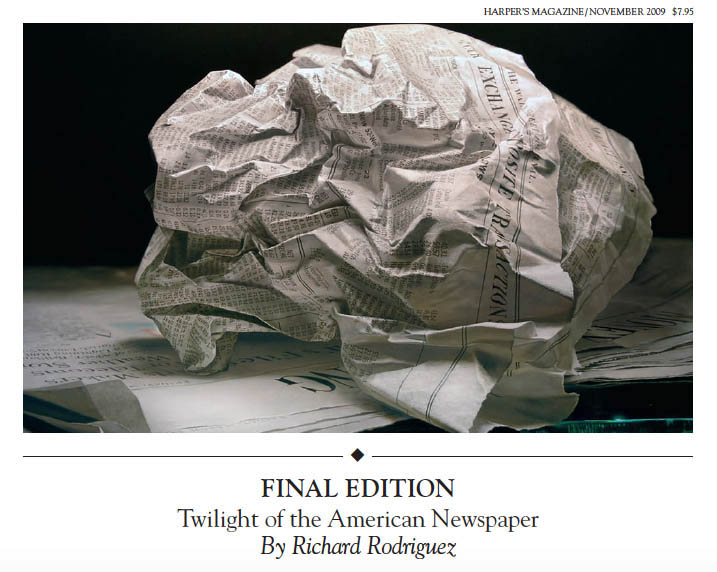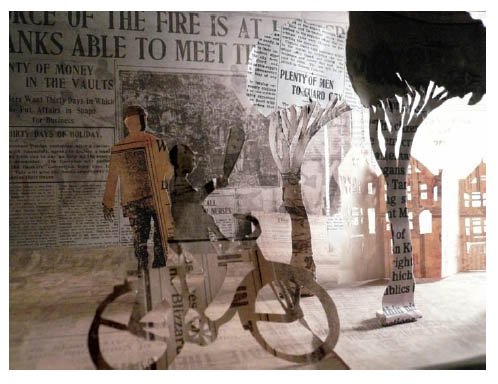
Because the teacher had once been to Chicago, she subscribed to the Sunday edition of the Chicago Tribune, which came on the train by Tuesday, Wednesday at the latest. Several generations of children learned to read from that text. The schoolroom had a wind-up phonograph, its bell shaped like a morning glory, and one record, from which a distant female voice sang “Ah, Sweet Mystery of Life.” Is it better to have or to want? My friend says her teacher knew one great thing: There was something out there. She told her class she did not expect to see even a fraction of what the world had to offer. But she hoped they might.
[…]
It was the pride and the function of the American newspaper in the nineteenth century to declare the forming congregation of buildings and services a city—a place busy enough or populated enough to have news. Frontier American journalism preserved a vestige of the low-church impulse toward universal literacy whereby the new country imagined it could read and write itself into existence. We were the Gutenberg Nation.
[…]
Unwilling to forfeit any fraction of my quarter, I even studied the classifieds— unrelieved columns laid out like city blocks: Room for rent. Marina. No pets. File clerk position. Heavy phones. Ticket agent for busy downtown box office. Must be bonded. Norman, we’re still here. Only once did I find the titillation I was looking for, a listing worthy of a barbershop magazine, an Argosy, or a Mickey Spillane: “Ex- Green Beret will do anything legal for cash.” Newspapers were sustained by classifieds, as well as by department-store ads and automobile ads. I admired the urbanity of the drawings of newspaper ads in those years, and I took from them a conception of the posture of downtown San Francisco. Despite glimpses into the classified life of the city, despite the hauteur of ad-art mannerism, the Chronicle offered some assurance (to an adolescent such as I was) it would have been difficult for me to describe. I will call it now an implied continuity.
[…]

In the nineteenth-century newspaper, the relationship between observer and observed was reciprocal: the newspaper described the city; the newspaper, in turn, was sustained by readers who were curious about the strangers that circumstance had placed proximate to them. So, I suppose, it is incomplete to notice that the San Francisco Chronicle has become remiss in its obituary department. Of four friends of mine who died recently in San Francisco, not one wanted a published obituary or any other public notice taken of his absence. This seems to me a serious abrogation of the responsibility of living in a city and as good an explanation as any of why newspapers are dying. All four of my friends requested cremation; three wanted their ashes consigned to the obscurity of Nature. Perhaps the cemetery is as doomed in America as the newspaper, and for the same reason: we do not imagine death as a city.
[…]
In this morning’s paper there is a quote from an interview San Francisco’s mayor, Gavin Newsom, gave to The Economist concerning the likelihood that San Francisco will soon be a city without a newspaper: “People under thirty won’t even notice.”
[…]
Something funny I have noticed, perhaps you have noticed it, too. You know what futurists and online-ists and cut-out-the-middle-man-ists and Davos-ists and deconstructionists of every stripe want for themselves? They want exactly what they tell you you no longer need, you pathetic, overweight, disembodied Kindle reader.
[…]
We already live in the America of USA Today, which appears, unsolicited, in a plastic chrysalis suspended from your doorknob at a Nebraska Holiday Inn or a Maine Marriott. We check the airport weather. We fl y from one CNN Headline News monitor to another. We end up where we started. An obituary does not propose a solution.
[…]
In the growling gray light (San Francisco still has foghorns), I collect the San Francisco Chronicle from the wet steps. I am so lonely I must subscribe to three papers—the Wall Street Journal, the New York Times, the San Francisco Chronicle. I remark their thinness as I climb the stairs. The three together equal what I remember.
— Richard Rodriguez, “Final Edition: Twilight of the American Newspaper.” Harper’s, November 2009.
